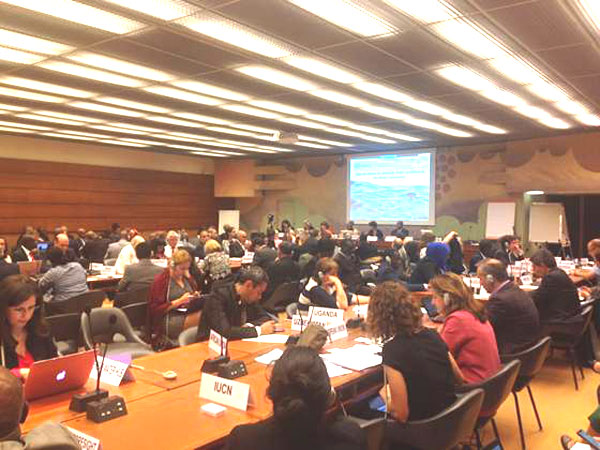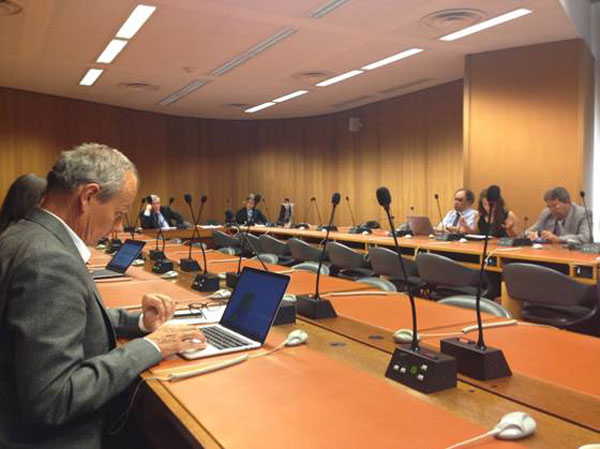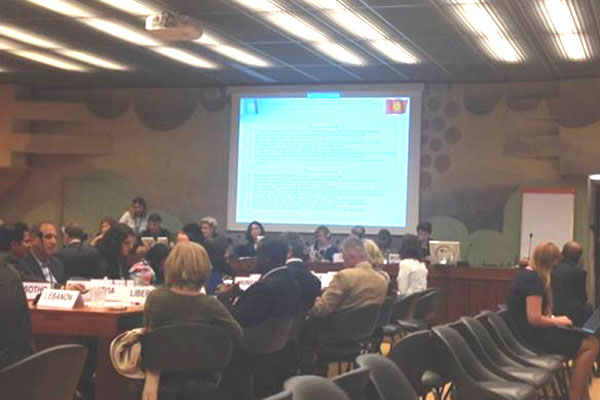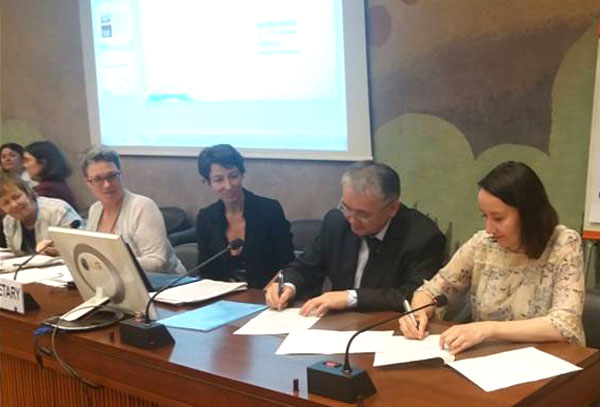JOINT MEETING OF WORKING GROUPS ON IWRM AND ON MONITORING AND ASSESSMENT UNDER THE UNECE WATER CONVENTION
The thirteenth meeting of the Working Group on Integrated Water Resources Management and the fourteenth meeting of the Working Group on Monitoring and Assessment under the Convention on the Protection and Use of Transboundary Watercourses and International Lakes (Water Convention) were held jointly on 28-30 May. The main objectives of the meeting were to:
- discuss the results and lessons learned from the reporting exercise under the Water Convention and on Sustainable Development Goal indicator 6.5.2, for which the United Nations Economic Commission for Europe (ECE) and the United Nations Educational, Scientific and Cultural Organization (UNESCO) are co-custodians;
- discuss and agree on the draft programme of work for 2019–2021 under the Convention to be submitted to the Meeting of the Parties to the Convention for adoption at its eighth session (Astana, 10–12 October 2018);
- discuss and agree on other documents and draft decisions to be submitted to the eighth session of the Meeting of the Parties, in particular in the light of the implementation of the Convention at the global level.
The following key points of the agenda were discussed during the meeting.
Monitoring and assessment of transboundary waters
The Co-Chair provided an overview of past work and activities on monitoring and data exchange in transboundary basins and presented the proposed activities in the draft programme of work for 2019–2021.
The reports on their work in relation to data monitoring and exchange were presented by the representatives of Chad, Senegal, Moldova, Ukraine and Austria. The partners from Moldova and Ukraine made presentation on water data and adaptation to climate change in the Dnestr River Basin. They developed and put into operation a common platform for hydrological data exchange through a network of national hydrometeorological services. Further the countries will start developing the joint basin plan.
For engagement of all participants in the discussion and identification of the most important points to be included in the programme of work for the next three years, the participants were organized in smaller groups. The results of discussion in those groups were reported by moderators. The reporters underlined the significance of error-free and reliable information that could be collected also through remote sensing. Additionally to the list of key data on water quantity and quality, the need was stressed to control the status of aquatic ecosystems in terms of biodiversity and fishes. The participants also voiced the problem of data quality and comparability that could not be solved frequently through joint measurements by riparian countries.
Progress in the ratification process and recent accession: Celebration of the accession of Chad
On 23 May 2018, Chad became the first country from outside the pan-European region to become a Party to the Convention. This important step was celebrated by a ceremonial session, where the diplomatic corps was invited as well. The Executive Secretary of UNECE Olga Algaerova made the opening statement.

The representative of Chad shared the reasons for the country’s accession, the process and lessons learned. Representatives of Senegal, Iraq and Cote d’Ivoire reported on their efforts towards acceding to the Water Convention. Representatives of Switzerland, Hungary, Germany, Finland, the Netherlands and the European Union expressed their willingness to assist other interested countries if they wished to know better about the Convention and the advantages of accession.
The global Convention — promotion and partnerships
The working groups were informed about activities carried out by the secretariat and partners to build capacity and raise awareness of the Convention, such as work meetings for Senegal (Dakar, 15 February 2018), Ghana (Accra, 25 January 2018), northern African countries (Tunis, 20–21 December 2017) and Central Africa (Brazzaville, 18–22 December 2017), as well as about other initiatives at the regional and global levels to build capacity on and awareness of the Convention.
The working groups discussed a draft revised strategy for the implementation of the Convention at the global level, including its relationship with the Convention on the Law of the Non-navigational Uses of International Watercourses and the role of key partners. It was decided to finalize the draft strategy and submit it for adoption by the Meeting of the Parties.
In the light of the global opening of the Convention, the working groups also reviewed the draft revised rules of procedure for the Meeting of the Parties prepared by the Bureau, with the support of the secretariat. The rules of procedure have been revised to reflect the global membership of the Convention.
The working groups discussed a draft decision on the designation and responsibilities of focal points prepared by the Bureau, with the support of the secretariat, before its submission to the Meeting of the Parties for adoption at its eighth session.
Reporting under the Convention and on Sustainable Development Goal indicator 6.5.2
In accordance with decision VII/2, reporting started with a pilot exercise in 2017 to test the reporting template.
Representatives of UNECE and UNESCO informed the working groups about the initial outcomes of the reporting under the Water Convention and on Sustainable Development Goal indicator 6.5.2, the validation of reports and the data submitted to the United Nations Statistics Division. The working groups were also updated on the next steps in terms of the analysis of the data at the global level, namely in the framework of the report of the Secretary-General on progress towards the Sustainable Development Goals to be submitted to the high-level political forum on sustainable development in 2018, the preparation of a synthesis report on Sustainable Development Goal 6 on clean water and sanitation by UN-Water and the preparation of a global baseline report on indicator 6.5.2 by ECE and UNESCO.
The draft synthesis report will be uploaded to dialogue.unwater.org for further discussion. The discussion will be held in three rounds. The first round of consultations was held from 2 to 31 May. It was focused on collection of general remarks and comments. The second round will take place from 25 June to 9 July to address the main outcomes of the report. And the third final round of consultations will be held from 31 August to 14 September and will be focused on future steps.
Support for implementation and application of the Convention
The working groups were briefed on the progress achieved in different projects supporting implementation of the Convention in countries of Eastern and South-Eastern Europe, the Caucasus and Central Asia.
The Programme of strategic actions was drafted in the Chu-Talas project; the work on Transboundary diagnostic analysis, data exchange and relationships building is under development in the Drin River Basin; the GEF project was started in the Dnestr River Basin; an expedition was undertaken in October 2017 and a meeting was held in May 2018 as part of hydrological cooperation project between Afghanistan and Tajikistan. The project of cooperation on water quality continues its work in Central Asia. The cooperation project on dam safety in Central Asia has gained very positive assessment from the project valuation committee.
The member of the Implementation Committee D.R.Ziganshina informed about the outcomes of the ninth meeting of the Implementation Committee (Geneva, 7–9 March 2018) and the preparation of the Committee’s report to the Meeting of the Parties. She noted that, in the recent years, activities of the Committee were focused on the analysis of national country reports. Considering that the term of five members of the Committee will expire at the next session of the Meeting of the Parties, the procedures for nomination and election of candidates were recalled.
Identifying, assessing and communicating the benefits of transboundary water cooperation
The working groups were briefed on progress in the application of the Policy Guidance Note in a number of basins worldwide, such as the Okavango, Sio-Malaba-Malakisi and Drina River basins, and the outcomes of the global workshop, “Moving forward transboundary water cooperation: Building on its benefits” (Geneva, 6–7 February 2018). The plans for preparing a summary brochure on the outcomes of the benefit assessment exercises was also presented. The participants were invited to provide their comments on the structure and key messages of the brochure.
The water-food-energy-ecosystems nexus in transboundary basins
The progress achieved in this area of work was presented and discussed, in particular the assessment for the Drina, the ongoing assessment of the North-Western Sahara Aquifer System, the work undertaken in the Drin basin and experience sharing to support application of the nexus approach in the Niger basin.

On 28 May 2018 in the first half of the day, a special session was devoted to this issue to discuss the synthesis publication, which would summarize the assessments of the water-food-energy-ecosystem nexus in transboundary basins. Representatives of the countries and organizations participating in this topic of work, including from the Syr Darya basin, were invited to this meeting. The participants discussed lessons learned from the assessments and further possible activities, including recommendations for future application of the assessment methodology. The assessments of the water-food-energy-ecosystem nexus can be found on: www.unece.org/env/water/publications/pub.html
Participants were also informed about the outcomes of the global workshop on water allocation in the transboundary context (Geneva, 16–17 October 2017).
Adapting to climate change in transboundary basins
Participants were briefed on the outcomes of the “International Workshop on Water Scarcity: Taking action in transboundary basins and reducing health impacts” (Geneva, 11?12 December 2017), a joint activity under the Water Convention and the Protocol on Water and Health, and the ninth meeting of the Task Force on Water and Climate (Geneva, 13 December 2017).
The working groups also reviewed progress on the pilot projects and other activities on climate change adaptation under the Convention. Presentations on adaptation measures in basins were made by G.Satymkulova (Chu-Talas) and A.Bon (Dnestr).
Participants also reviewed and provided comments to the draft Words into action “Implementation Guide for Addressing Water-Related Disasters and Transboundary Cooperation”.

Water and industrial accidents
The working groups reviewed progress in the implementation of the workplan for 2017–2018 of the Joint Ad Hoc Expert Group on Water and Industrial Accidents and discussed the draft guidance on firefighting water retention in a transboundary context.
European Union Water Initiative and National Policy Dialogues
Participants were updated on recent developments in the European Union Water Initiative National Policy Dialogues on Integrated Water Resources Management (facilitated by ECE) and Water Supply and Sanitation (facilitated by the Organization for Economic Cooperation and Development). In many countries of the region, the focus of the national dialogues is on elaboration of a national water strategy (Azerbaijan, Belarus, Georgia, and Ukraine).
A representative of the Belarus Ministry of Natural Resources and Environmental Protection told about measures undertaken in the country for implementation of the main provisions of the Water Convention.
Participants expressed their concerns over the reduction of the financing for dialogues in Central Asia.
International Water Assessment Centre
The International Water Assessment Centre was officially opened in Kazakhstan on 7 December 2018. The Director of the Centre briefed the working groups on the Centre’s terms of reference and planned activities.
The memorandum of cooperation was signed between the Centre and the SIC ICWC of Central Asia during the session.

Programme of work for 2009-2021
Participants were informed in detail of the outcomes of the consultative process of the development of the programme of work for 2019–2021, which consisted of discussions in the different intergovernmental bodies, an online survey and selected interviews. On this basis, a draft programme of work for 2019–2021 had been prepared by the Bureau. It consists of the following programme areas:
- Programme area 1: Increasing awareness of and accession to the Convention and application of its principles drawing on the benefits of cooperation
- Programme area 2: Supporting monitoring, assessment and information sharing in transboundary basins
- Programme area 3: Promoting an integrated and intersectoral approach to water management at all levels
- Programme area 4: Adapting to climate change in transboundary basins
- Programme area 5: Facilitating financing of transboundary water cooperation
- Programme area 6: Reporting on Sustainable Development Goal indicator 6.5.2 and under the Convention
- Programme area 7: Partnerships, communication and knowledge management.
Representative of SIC ICWC D.R.Ziganshina thanked the secretariat and the Bureau for the work done and maximum possible consideration of the suggestions made by the Parties and concerned organizations in the preparation of the Programme of work. SIC ICWC is ready to render partner’s support in implementation of the proposed areas, particularly through its involvement in the working group on water allocation in transboundary basins. SIC ICWC is also willing to cooperate in monitoring of water bodies through remote sensing. Experience of similar work is already available.
Preparation for the eighth session of the Meeting of the Parties
The representative of Kazakhstan Mukhtar Zhakenov reported on the organizational preparations for the Meeting of the Parties in Astana, for which approx. $500,000 were allocated. All were invited to take part in this event as participants or organizers of side events.
D.R. Ziganshina
|